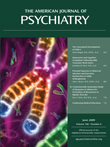Depression and Cognitive Complaints Following Mild Traumatic Brain Injury
Abstract
Traumatic brain injury (TBI) is a common occurrence with multiple possible neuropsychiatric sequelae, including problems with cognition, emotion, and behavior. While many individuals experience significant improvement over the first months following mild TBI, a nontrivial minority will develop persistent, functionally impairing post-TBI symptoms. Depression and cognitive impairment are among the most common such symptoms, and they may respond to a combination of rehabilitative and pharmacologic treatments. This article discusses the clinical approach to treating an individual with depression and cognitive complaints following mild TBI. Recommendations regarding the diagnosis, evaluation, and treatment of these problems are offered.



